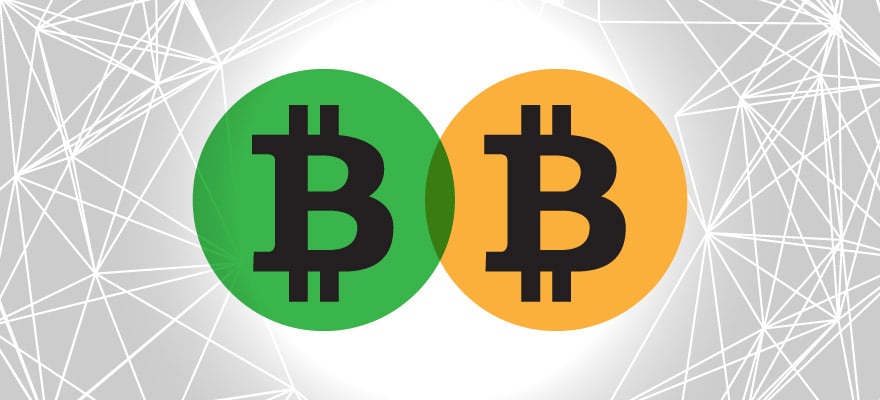A hard fork is seeming more and more likely for Bitcoin Cash following the decision to implement a ‘pre-consensus’ protocol on November 15.
Now, in plain English:
The Bitcoin Cash network has scheduled a software upgrade. If there aren’t enough stakeholders who support the software upgrade, a separate Blockchain (and a new cryptocurrency) could be formed. When this happens, it’s called a hard fork--a divergence that results in a split. A fork is just another way to say ‘software upgrade’; when a fork doesn’t result in the formation of two separate chains, it’s called a ‘soft fork.’ Bitcoin Cash has undergone at least one soft fork in the past.
This time around, the proposed fork involves a ‘pre-consensus’ protocol. The developer responsible for creating the upgrade, Amaury Sechet, describes this protocol as "a set of technologies allowing network participants to agree as much as possible on what the next block is going to look like."
HOW TO SURVIVE A HARD FORK IN BCH - a survival guide for miners and businesses https://t.co/a84GsawlBZ
— David Jerry (@digitsu) September 23, 2018
The pre-consensus protocol has been the subject of hot debate ever since Sechet posted plans describing the fork in July. Beijing-based mining giant Bitmain has said that it supports the fork, which many consider to be the ‘magic bullet’ to implement the software upgrade without the formation of a new chain.
What does this mean for the future of Bitcoin Cash?
Hot Debate Over the Future of BCH
A number of other prominent and controversial figures in the crypto community have spoken out vehemently against the proposed upgrade. Craig S. Wright, the self-proclaimed Satoshi Nakamoto (creator of Bitcoin), has expressed major displeasure with Bitcoin ABC’s Wormhole Partnership with Bitmain. Bitcoin ABC is the group of developers responsible for creating Bitcoin Cash.
A 1% miner who (as ABC wants to do) tries to change the protocol is the attacker.
The dishonest miner is the one seeking to alter the rules or allow them to be altered. That is Bitcoin. A 51% attack requires changing the rules - or it is not an attack. ABC like Core want this — Dr Craig S Wright (@ProfFaustus) October 29, 2018
The Wormhole Partnership granted Bitmain the power to burn BCH tokens to create scarcity on the network, a practice that is supposed to maintain the value of the digital currency. Wright has spoken out against the partnership and released his own whitepaper in response to the collaboration that proposes (among other things) a 128mb block size for BCH.
Individuals on both sides of the debate have been accusing each other of conspiring. Bitmain founder Jihan Wu came after SBI Holdings, a financial services company group based in Tokyo, Japan:
SBI threaten to attack BCH with their hashing power, to help CSW control BCH. They are bad people, and they will fail.
— Jihan Wu (@JihanWu) September 6, 2018
A Hard Fork Could Negatively Impact Businesses Who Rely on the BCH Ledger
Of course, the company denied Wu’s accusations. However, Jerry Chan, Head of Department at SBI Crypto Solutions, pointed out that a split wouldn’t bode well for cryptocurrency as it pertains to use within businesses and institutions. SBI Crypto Solutions is the cryptocurrency department of SBI Holdings.
“As a main proponent of the business community which is involved in many blockchain development projects, the biggest risk in using a public blockchain is the ability of the ledger to split beyond the control of the users of the system to prevent,” Chan told Finance Magnates. “At the end of the day, the reason to honor the longest sustained proof of work chain is stemming from the desire to maintain just 1 BCH chain.”
The risk of a hard fork “makes using the blockchain for long term contracts untenable due to the fact that ledger splits will cause much legal issues for those who have contracts on the ledger. Therefore in order for businesses to use public ledgers for their applications (more than just simple Payments ) we require a modicum of assurance that the chain will not split permanently after we start using it as our public shared record of contracts and trades.”

Jerry Chan, SBI Crypto Solutions.
Therefore, Chan believes that the formation of a new chain is not in the best interest of the Bitcoin Cash community at large. “The only way this can be assured is if we as a community always and only support the chain with the longest and most sustained proof of work applied to it. (sustained as to exclude temporary chain re-organizations caused by proponents 'buying' or 'borrowing' hashpower from BTC mining in order to change the BCH chain. This will not be further necessary after BTC mining is a minority as compared to BCH).”
At the same time, however, Chan acknowledged that Bitcoin Cash is in need of changes that would make it more usable. “We believe Bitcoin Cash must scale to global payment levels in order to be successful,” he said. “We also believe that a crypto currency is meant to be USED and not just held, for the velocity of money is a big part of its value proposition.”
The Irony of Bitcoin Cash’s Origins
Bitcoin Cash itself came into being as the result of a hard fork from the Bitcoin blockchain. There was a serious debate in the Bitcoin community about Bitcoin’s functionality.
Those who believed that Bitcoin was a sort of ‘digital gold’ (meaning an investment to hold onto for longer periods of time) did not want to increase its scalability. Those who saw Bitcoin as ‘digital cash’ (meaning a tool for transacting quickly and regularly), well, did. There were still others who wanted to increase Bitcoin’s transaction capabilities but disagreed with how the proposed software upgrade was going to do it.
In the end, there weren’t enough supporters of the software upgrade to implement it onto the existing Bitcoin network. Thus, Bitcoin Cash was formed. With it came a group of supporters who claimed it was ‘the real Bitcoin,’ and confusion ensued--but that’s another story for another time.
Will a Hard Fork Actually Happen?
The irony that BCH may be facing a hard fork hasn’t been lost on the crypto community at large.
Roger Ver, the ‘Bitcoin Jesus’ turned ‘Bitcoin Judas,’ was one of the loudest voices supporting the software upgrade that resulted in the creation of Bitcoin Cash. He is also one of the leaders of the ‘BCH is the real Bitcoin’ movement. For now, Ver still hasn’t announced which side of the camp he’s on--however, he has publicly stated that both sides of the community should respect the freedoms of their opponents, even if a hard fork does take place.
"If it wasn't for those people willing to dissent with the minority hash rate, Bitcoin Cash would never exist,” he said on Bitcoin Cash News. He also told Bloomberg he doesn’t believe that the ideological split in the community is big enough to actually happen.
Joey King, a software developer at Bitcoin.com, echoed Ver’s statements. Bitcoin.com is a company that provides Bitcoin and Bitcoin Cash services; Ver is the company’s CEO. “I don't think a split is likely,” King told Finance Magnates. "When you look at the run up to the original Bitcoin Cash fork in August of 2017, you see that both camps spent years negotiating and jockeying for position. When the fork finally happened, it came as a surprise even to industry veterans and insiders.”

Joey King, Bitcoin.com.
King added that the relatively high amount of media coverage on the fork might have allowed some preventative actions to be taken: “now we have multiple sides loudly proclaiming their intentions to fork. Noise about a split offers leverage. When the intention is to fork, secrecy prevails.”
The Show Must Go On
Even if a hard fork is ultimately unlikely, a growing number of companies are behaving as though it may happen. More and more cryptocurrency exchanges have published plans for a post-hard fork scenario; CoinEx posted an announcement that “Should [the hard fork] happen, all Bitcoin Cash holders will then receive BSV assets against a 1:1 ratio on your BCH assets.” BSV is the new currency that will form if the hard fork takes place.
Despite the fact that Bitcoin Cash has stayed within the top 10 in terms of coins with the largest market caps since its 2017 origin, it is still a young network--one that is bound for change. This is the first serious test of BCH’ mettle; the way that the network (and its community) handle the upcoming fork will determine its future forever.






















